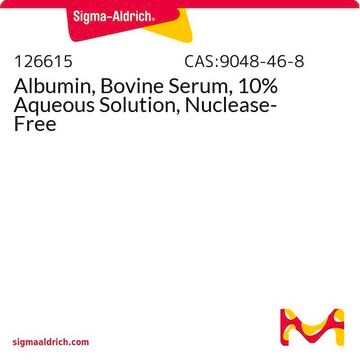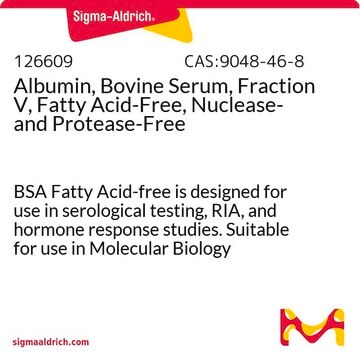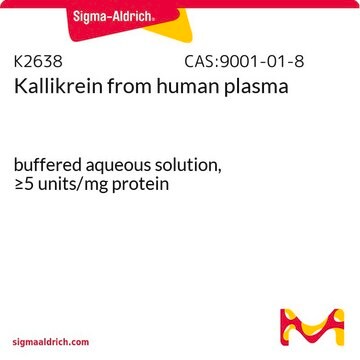B8894
Albumin, Acetylated from bovine serum
protease free, for molecular biology
Synonym(s):
Ac-BSA, Acetyl BSA, Acetylated BSA
About This Item
Recommended Products
biological source
bovine
Quality Level
grade
for molecular biology
product line
BioReagent
form
solution
purified by
heat shock fractionation
contains
does not contain stabilizer or preservative
origin
USA origin
concentration
20 mg/mL in H2O
technique(s)
FISH: suitable
impurities
HIV I and HIVII, HCV and HBsAg, tested negative
UniProt accession no.
foreign activity
DNase free
DNase, RNase, NICKase and protease, none detected
NICKase free
Protease free
RNase free
storage temp.
−20°C
Gene Information
bovine ... ALB(280717)
Looking for similar products? Visit Product Comparison Guide
General description
Acetylation of bovine serum albumin particularly modifies lysine (Lys) residues with elevated frequency, with lesser degrees of modification of serine (Ser) and threonine (Thr) residues. MALDI-TOF mass spectrometry analysis of acetylated BSA has indicated an increased MW of about 3000, compared to native BSA (Ostatná, V. et al., J. Electroanalytical Chem., 821, 97-103 (2018)).. This acetylation process also derivatizes similar amino acid residues in any trace contaminating nucleases in the BSA, to inactivate that nuclease activity. This makes acetylated BSA useful in molecular biology applications where trace nuclease activity must be minimized.
Application
- In cDNA library preparation (Hafner, M. et al., RNA, 17(9), 1697-1712 (2011))
- As a blocking agent with streptavidin beads used for capture of biotinylated RNA (Winz, M.-L. et al., Nat. Protocol., 12(1), 122-149 (2017))
Biochem/physiol Actions
Features and Benefits
- DNase-free / Exonuclease-free
- Nickase-free / Endonuclease-free
- Protease-free
- RNase-free
Storage Class Code
11 - Combustible Solids
WGK
WGK 3
Flash Point(F)
Not applicable
Flash Point(C)
Not applicable
Personal Protective Equipment
Certificates of Analysis (COA)
Search for Certificates of Analysis (COA) by entering the products Lot/Batch Number. Lot and Batch Numbers can be found on a product’s label following the words ‘Lot’ or ‘Batch’.
Already Own This Product?
Find documentation for the products that you have recently purchased in the Document Library.
Customers Also Viewed
Our team of scientists has experience in all areas of research including Life Science, Material Science, Chemical Synthesis, Chromatography, Analytical and many others.
Contact Technical Service






